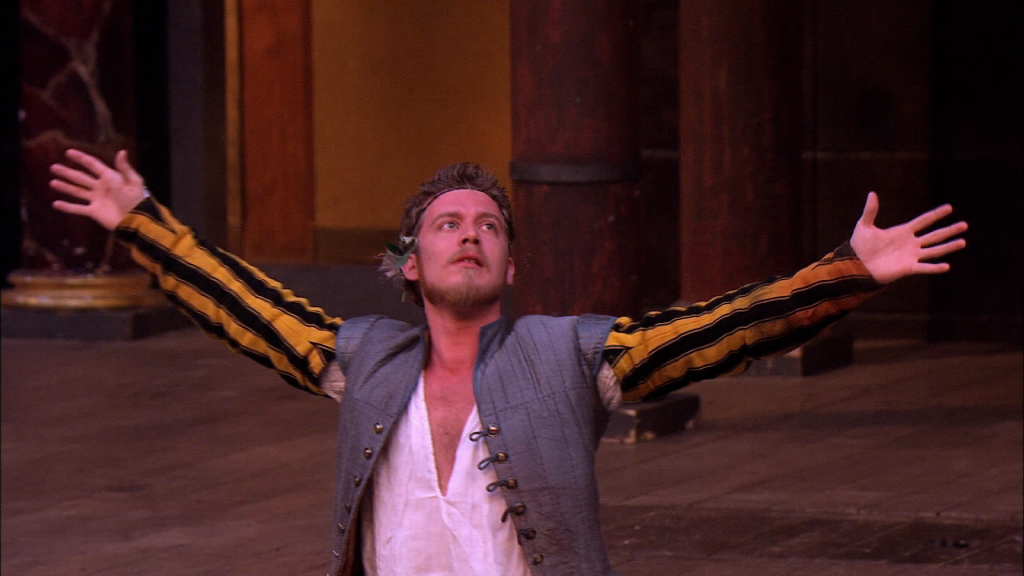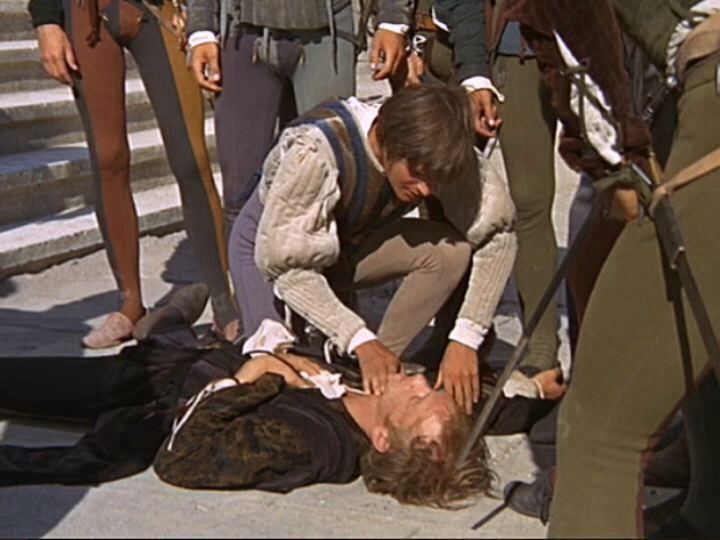The tragic death of Mercutio in Shakespeare’s play “Romeo and Juliet” is a pivotal moment that sets in motion a series of events leading to the ultimate demise of the young lovers. While it may seem clear that Tybalt is responsible for Mercutio’s death, a closer examination reveals a complex chain of events and shared responsibility.
The fatal altercation between Mercutio and Tybalt occurs during a heated street fight. Tybalt, a hot-headed member of the Capulet family, seeks revenge against Romeo for attending the Capulet’s masked ball uninvited. In a fit of rage, Tybalt confronts Romeo, seeking to provoke him into a duel. Romeo, now married to Tybalt’s cousin Juliet, tries to defuse the situation by refusing to fight.
However, Mercutio, Romeo’s loyal friend, intervenes on his behalf. Mercutio is a quick-witted and fiery character, known for his sharp tongue and readiness to engage in a fight. Disgusted by Romeo’s reluctance to defend his honor, Mercutio steps in, engaging Tybalt in a fierce duel.
In a tragic turn of events, Romeo attempts to stop the fight between Mercutio and Tybalt. As he steps between them, Tybalt takes advantage of the opening and thrusts his rapier, fatally stabbing Mercutio. The suddenness of the attack catches everyone off guard, leaving Mercutio mortally wounded and shocked by the turn of events.
It is important to note that Romeo’s intervention, although well-intentioned, inadvertently leads to Mercutio’s death. By placing himself between the two combatants, Romeo unintentionally creates an opening for Tybalt’s fatal strike. This ironic twist of fate further highlights the tragic consequences of the ongoing feud between the Capulets and the Montagues.
While Tybalt is directly responsible for delivering the fatal blow, it is crucial to recognize the shared responsibility that led to Mercutio’s demise. Romeo’s initial refusal to fight and subsequent attempt to mediate the conflict indirectly contributes to the tragic outcome. Additionally, the ongoing animosity between the two feuding families fuels the aggression and violence that ultimately claims Mercutio’s life.
The death of Mercutio in “Romeo and Juliet” is a complex event that involves multiple characters and factors. While Tybalt is the one who physically stabs Mercutio, Romeo’s intervention and the underlying family feud play crucial roles in this tragic turn of events. The interplay of these factors underscores the themes of fate, impulsive actions, and the destructive nature of hatred and violence.
Who Killed Tybalt?
In the play Romeo and Juliet by William Shakespeare, Tybalt is killed by Romeo. After Tybalt and Mercutio engage in a heated verbal exchange, Romeo tries to intervene and stop the fight. However, Tybalt refuses to listen and continues to provoke Romeo. Eventually, Romeo’s anger gets the best of him and he draws his sword to defend himself. A fierce fight ensues between Romeo and Tybalt, resulting in Romeo ultimately killing Tybalt. This tragic turn of events leads to dire consequences for both Romeo and Juliet, as it sets off a chain of events that leads to their untimely deaths.

Who Killed Mercutio Why?
Mercutio’s death in Shakespeare’s play Romeo and Juliet is attributed to Tybalt. There are several reasons why Tybalt can be held responsible for Mercutio’s demise:
1. Direct involvement: Tybalt is directly involved in the altercation that leads to Mercutio’s death. During a heated confrontation between Tybalt and Romeo, Mercutio steps in to defend his friend. In the ensuing scuffle, Tybalt thrusts his rapier under Romeo’s arm and inadvertently stabs Mercutio, causing his fatal injury.
2. Provocation: Prior to the fatal encounter, Tybalt instigates the conflict by seeking out Romeo, who is now married to Tybalt’s cousin Juliet. Tybalt’s hatred and desire for revenge against Romeo drive him to provoke a confrontation, disregarding the potential consequences.
3. Hot-headedness: Tybalt is portrayed as a hot-headed and volatile character throughout the play. His quick temper and eagerness to engage in violence make him more likely to escalate conflicts. This impulsive nature ultimately leads to Mercutio’s demise.
4. Tybalt’s intent: Although Tybalt may not have intended to kill Mercutio specifically, his actions and choice to engage in a swordfight with Romeo demonstrate his disregard for the potential consequences. Even if he did not directly intend for Mercutio’s death, his reckless behavior ultimately leads to the tragic outcome.
Tybalt is to blame for Mercutio’s death because he directly stabs him during a confrontation and his actions prior to the incident provoke the conflict. Tybalt’s hot-headedness and intent to engage in violence contribute to the tragic outcome, making him responsible for Mercutio’s untimely demise.
Why Did Tybalt Kills Mercutio?
Tybalt kills Mercutio in the play “Romeo and Juliet” for a few reasons. Firstly, there is a long-standing feud between the Montague and Capulet families, and Tybalt is a member of the Capulet family while Mercutio is a close friend of Romeo, a Montague. This feud has fueled a deep hatred between the two families, and Tybalt sees Mercutio as an enemy due to his association with Romeo.
Secondly, Tybalt is a hot-headed and aggressive character who is known for his quick temper and love for violence. He is easily provoked and is always ready for a fight. When Mercutio engages in a verbal battle with Tybalt, insulting him and defending Romeo’s honor, Tybalt’s pride is wounded, and he feels the need to retaliate.
Furthermore, Tybalt sees Romeo’s intervention as a sign of weakness and an opportunity to strike. Romeo, who is now married to Tybalt’s cousin Juliet, tries to stop the fight between Mercutio and Tybalt. In the chaos, Romeo steps between them, unknowingly providing an opening for Tybalt to stab Mercutio under Romeo’s arm.
Tybalt kills Mercutio because of the deep-rooted family feud, his hot-headed and aggressive nature, and the perceived opportunity to harm Romeo, whom he despises. The tragic consequences of this act set off a series of events that ultimately lead to the deaths of Romeo and Juliet.
Who Is At Fault For Mercutio’s Death?
The responsibility for Mercutio’s death in William Shakespeare’s play “Romeo and Juliet” can be attributed to a combination of factors involving several characters. While it may be tempting to assign blame solely to one individual, it is essential to consider the sequence of events leading to Mercutio’s demise.
1. Tybalt’s aggression: The initial instigator of the conflict is Tybalt, a hot-tempered Capulet. He provokes Mercutio by challenging Romeo to a duel, seeking retribution for Romeo’s presence at the Capulet party. Tybalt’s aggressive nature and unwillingness to back down contribute to the escalating tensions.
2. Romeo’s intervention: In an effort to prevent further violence and maintain peace, Romeo attempts to intervene in the fight between Tybalt and Mercutio. Romeo’s intervention is driven by his love for Juliet and his desire to avoid bloodshed within the family. However, his involvement inadvertently leads to Mercutio’s tragic end.
3. Mercutio’s defiance: Despite Romeo’s well-intentioned intervention, Mercutio refuses to step aside, fueled by his pride and loyalty to Romeo. He engages in a heated verbal exchange with Tybalt, which eventually escalates into a physical confrontation.
4. Romeo’s interference: In the midst of the escalating fight, Romeo again intervenes, this time attempting to separate Mercutio and Tybalt physically. In the confusion and chaos, Romeo inadvertently creates an opening for Tybalt to strike a fatal blow, unknowingly causing Mercutio’s death.
In light of these events, it is challenging to assign sole blame for Mercutio’s death to any one character. Tybalt’s initial aggression, Romeo’s well-intentioned but ill-fated intervention, and Mercutio’s defiance all contribute to the tragic outcome. Each character’s actions and choices intertwine, resulting in a chain of events that ultimately leads to Mercutio’s untimely demise.
The play itself explores themes of fate, impulsiveness, and the destructive nature of feuds, highlighting how multiple factors can contribute to a tragic outcome. Shakespeare deliberately crafts a complex web of responsibility, illustrating that in the midst of conflict, even the noblest intentions can have unintended and devastating consequences.

Conclusion
The tragic death of Mercutio in William Shakespeare’s play, Romeo and Juliet, can be attributed to Tybalt’s actions. Tybalt, fueled by anger and seeking revenge, engages in a heated verbal exchange with Romeo, which leads to a physical confrontation. Despite Romeo’s attempts to prevent the fight, Tybalt stabs Mercutio underneath Romeo’s arm, ultimately causing his demise. The irony lies in the fact that Romeo’s well-intentioned intervention inadvertently facilitates Tybalt’s fatal blow. This turn of events highlights the devastating consequences of the ongoing feud between the Capulets and the Montagues, as well as the tragic twists of fate that unfold throughout the play.
